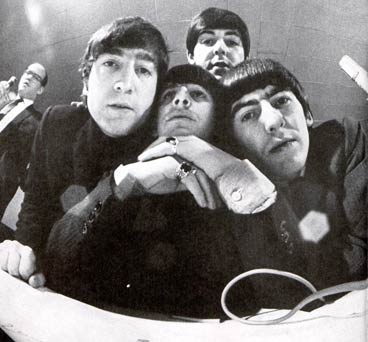1963: Beatles Invasion!

It was 50 years ago that the Beatles entered Abbey Road Studios in London to begin a marathon recording session. Out of the 10 songs they recorded, they immediately released “Please Please Me.” Sales in the U.S. were so poor, the song didn’t even appear on the music charts. Yet one year after the recording session, the Beatles arrived at New York’s Kennedy International Airport to be greeted by 3,000 screaming fans.
Even now, it’s hard to understand how the Beatles managed to rise to such stardom in so short a time. For three years, they had been playing dockyard bars in Liverpool, England, and Hamburg, Germany. Then, in the space of few months, they started appealing to the American imagination and built an army of screaming, adoring fans.
This sudden fame surprised the world. It also surprised the Beatles. (Asked what he thought about their sudden popularity, John Lennon replied, “I think everyone has gone daft.”) But it didn’t surprise America’s pundits and commentators, most of who were ready with a quick explanation; the Beatles were just a passing fad, another teenage craze like the one inspired by Elvis. The only thing that distinguished this group was their haircuts, which seemed to elicit endless criticism from adults.
Among the critics was Vance Packard, who wrote “Building the Beatle Image” for a March 21, 1964, issue of The Saturday Evening Post. Packard was an investigative journalist who had written best-sellers about status, conformity, and advertising in America. Like many critics, he attributed the popularity of the Beatles’ music to its ability to set parents’ teeth on edge. But Packard saw something other commentators missed: the Beatles had an “exciting sense of freshness. … Surliness is out, exuberance is in. … Pomposity is out, humor is in.”
The humor came through repeatedly in the Beatles press conferences, where John, Paul, George, and Ringo turned the question-and-answer sessions into spontaneous comedy routines.
Q: How did you ever decide on a name like The Beatles for the group?
John: Well, I had a vision when I was 12, and I saw a man on a flaming pie, and he said, ‘You are Beatles with an A.’ And we are.Q: What’s the rudest question you’ve been asked?
Ringo: The rudest was, someone said to me, ‘How are you doing, John?’
John: That’s not rude.
Ringo: (jokingly) Well, it was an insult.Q: The airport police were quite concerned about some oversized roughnecks who tried to infiltrate the crowd.
Paul: That was us!Q: A psychiatrist at one of your concerts in Seattle said the effect on the children—14,000 kids in there—he called it unhealthy, and he said you had a neurotic effect. How do you feel about this?
John: It was probably him that was unhealthy, watching it.Q: John, how would you describe yourself in one word?
John: I don’t know.
Paul: ’John.’
John: ’John,’ yeah. Thank you.Q: What do you think about the criticism that you are a bad influence?
Paul: I dunno, you know. I don’t feel like a bad influence. (to John) Do you?
John: Nah, I think you’re a good influence, Paul.
Paul: Thank you, John.Q: As you’re confined to your room all day, what do you do?
George: Oh! Tennis and water polo.Q: Have you been heckled at all? Have you ever had …
Paul: Oh, yeah! We used to have it in—especially in the early days! But John—John had a perfect answer! What was it …? ‘Shut up!’Q: I must tell you, by the way, that Detroit University have got a ‘Stamp Out The Beatles’ movement.
George: I know, yeah.
John: Yeah, we heard something about that.
Paul: We’ve got a ‘Stamp Out Detroit!’
Q: They think your haircuts are un-American.
John: Well, it was very observant of them because we aren’t American, actually.
Paul: (laughs) True, that.Q: How long do you think Beatlemania will last?
John: As long as you all keep comin’.
While the Beatles could charm reporters, their comic improvisations wouldn’t have made them so popular. It was their music—a bright sound with fresh melody lines, interesting harmonies, and a strong beat (so strong, Packard noted, that you could still follow it amid the screams of their fans.)
They also had a healthy borrowing of several American musicians. Years later, John recalled that he wrote “Please Please Me” after hearing Roy Orbison singing “Only The Lonely.” He was suddenly motivated to write an “Orbison song.” For lyrics, he recalled an old Bing Crosby song he’d heard as a child, “Please, lend your little ear to my pleas.”
When he performed it the recording studio, he sang the descending melody line—“Last night I said these words to my girl”—while Paul sang a high note in harmony. It was an effect he freely admitted he’d borrowed from the Everly Brothers.
Before flying to America where the Beatles were so noisily received, Paul McCartney worried that the group had nothing to offer. Americans already had their own groups. “What are we going to give them that they don’t already have?” The answer was talent, hard work, imagination, and the intelligence to musically borrow from the best.